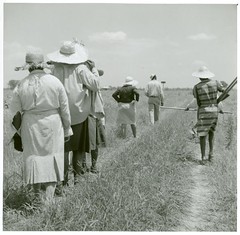 Image by New York Public Library via FlickrWe have identified new avenues that have not been previously considered through the lens of genealogy. Recently we have provided examples of records documenting peonage after 1865 surrounding topics such as chain gangs, asylums, orphanages, the circus, and more.
Image by New York Public Library via FlickrWe have identified new avenues that have not been previously considered through the lens of genealogy. Recently we have provided examples of records documenting peonage after 1865 surrounding topics such as chain gangs, asylums, orphanages, the circus, and more.Without delving into some of these records there are those who may not be able to identify an ancestor. Equally or more important is the fact that after slavery was outlawed, the slave master engineered a new system to extract the labor and resources from African Americans involuntarily. How does one go about revealing a system such as this which if you call it slavery or peonage, people deny it exists because it has been declared illegal under those terms? Well, we have living examples of people who are coming forward to share their experiences living in modern slavery in America.
Recenty on Nurturing Our Roots internet radio, we interviewed Blues singer, Sheba, Queen of the Mississippi Blues. See album, Butter on My Roll. After her mother became frustrated about working for the "boss man" growing and picking cotton and always owing him at the end of the year, she decided to leave without even telling her parents. Her children watched her depart from the field late at night. She was gone for about nine months. She, unlike most parents, returned to Sunflower, Mississippi for her seven children in 1965. There was only one catch. Athough the family had worked hard to bring in the cotton crop in her absence, the "boss man" still claimed Sheba's mother owed him and had to pay in order to keep anything from happening to her before he would let her leave that place with her children to go to Florida.
Sheba's mother would work all year, and after the debts were settled, she barely came away with forty dollars for a year's work. That, my friends, was the labor system that took the place of slavery. It was not called slavery anymore, however, entire families worked in cotton fields for no pay because the books were adjusted to show they had over-extended their credit. They would remain trapped in a system where they would never know increase. According to Sheba, cotton picking has been replaced today by catfish farming.
When her family escaped from Mississippi in 1965, they went to Florida where at the age of 12, Sheba lived in a labor camp and worked alongside the tomato pickers with other Mexicans and Blacks. The new condition was only slightly fairer than the one they had left.
So, even though the freedmen in Galveston, TX were late in hearing about Emancipation, we are here to issue a second such notice which is more than 150 years overdue. A form of slavery continued well into the 20th Century for thousands of African Americans. Millions of records documenting involuntary servitude exist in the National Archives and local courthouses and libraries. Only the term "slavery" was nullified because it could not be applied after being declared illegal weakening the ability to prosecute while the system still existed and even intensified.
We will have more to share in upcoming posts on Sheba's experiences, but for now in response to the various Juneteenth celebrations we have this to offer:
"I am here to issue a telegram that is over 150 years overdue. I would like to know how many Juneteenth celebrations will disclose the fact of slavery in all forms and slavery into the 20th Century? I would like to know how many of them will be including the fact that slavery did not end with Emancipation. Juneteenth should be about more than just celebrating and face painting, and fashion shows and music.
I come to bring a report that slavery still exists, and people are still living in poverty on the plantation. Children are being used as sex slaves. I would like to ask that the organizers of Juneteenth celebrations to please make this announcement.
It is so hard to believe that the Civil War did not really set us free? Was it just an act or just a bill? Are we free? Are we free to keep our children from the prison system? If anything we are still in Reconstruction. We need to educate during Juneteenth celebrations. I cannot celebrate Juneteenth unless I would be able to go and teach and bring new substance.
To those of you who celebrate freedom, I do not have anything to celebrate until I know that the last person is off the plantation and we have done everything and can give a report about slavery in the 20th Century. It is an injustice to celebrate freedom in 1865 and not look at 20th Century slavery. We cannot reconstruct anything until we have all the facts.
Some families just received their freedom in the 1960's. Do we not believe that these families are still in Reconstruction trying to adapt to a system and in need of the resources that will bring them up to the level of the 21st Century?
For example, they are without energy efficient homes with air conditioning and heat, and some are without homes. In some deep rural areas throughout the South they are without public transportation, and some are without private transportation. They lack federal and state resources that can empower them. If we continue to only discuss slavery in the past tense, we will continue to overlook the existence of new forms of slavery. We fail to realize poverty was the result of slavery. If we continue to focus on slavery in the past, we will not be able to identify the new forms of slavery." Antoinette Harrell, genealogist and peonage researcher.


